Our school chairs highlight the central role of artificial intelligence in each engineering discipline.
(text and background only visible when logged in)
Artificial intelligence (AI) and machine learning (ML) are common threads across the College’s programs. Our researchers are increasingly using the technology to make new discoveries and improve the human condition. And new academic programs are teaching our students how AI and ML work.
We asked our school chairs to describe how AI and ML are at the core of every discipline and where they’re headed next.
(text and background only visible when logged in)
Daniel Guggenheim School of Aerospace Engineering
Mitchell L. R. Walker II
William R. T. Oakes Professor and Chair
“The AE School develops AI algorithms for control systems and other applications, and we leverage existing AI algorithms for space mission design and extracting robust features from image data.
In undergraduate teaching, AI helps introduce students to fundamental concepts in thermodynamics, fluid mechanics, and statistical learning using small language models and Gaussian processes for building supervised and unsupervised learning models. At the graduate level, ML surrogate modeling methods are used to deepen understanding and application in advanced course work.”
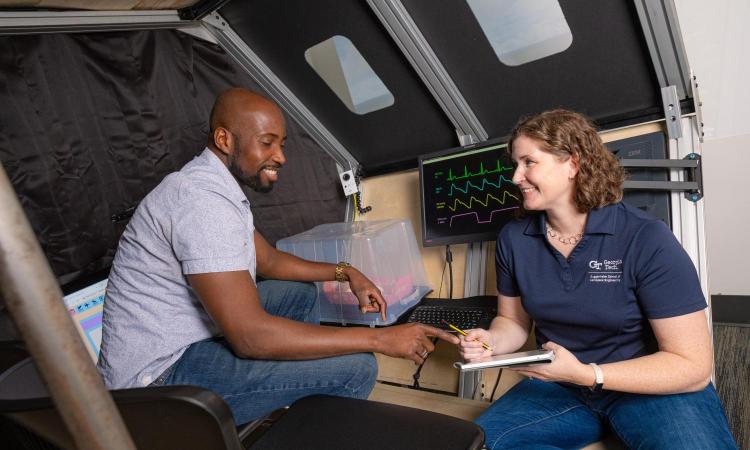
Air Autonomy
AE Professor Karen Feigh is looking to the skies for the future of AI and health.
Wallace H. Coulter Department of Biomedical Engineering at Georgia Tech and Emory University
Alyssa Panitch
Wallace H. Coulter Chair
“Fueled by advances in molecular profiling, imaging, and many other technologies, biomedical research is becoming more data intensive than ever. The explosion of data enables biomedical engineering to take advantage of the amazing developments in data science and AI. This trend manifests in the increasing number of our research projects incorporating AI, as well as new curriculum to introduce AI techniques at the undergraduate and graduate levels.”
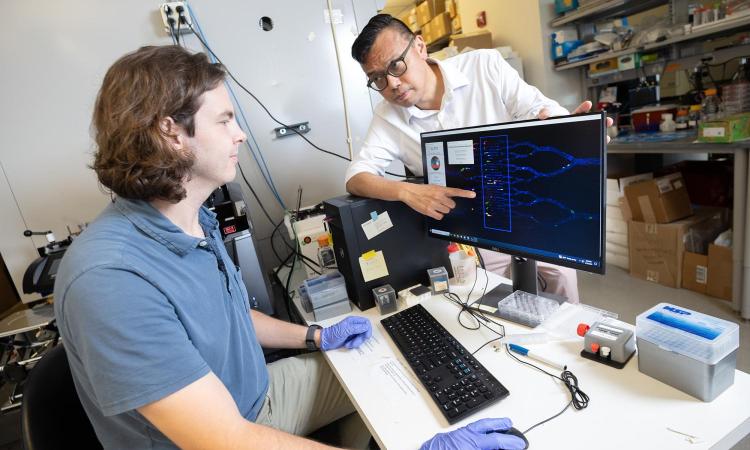
New Software Means Biomedical Researchers Don’t Have to Be Computer Scientists Too
BME team creates open-source tool that lets researchers use AI to analyze images.
School of Chemical and Biomolecular Engineering
Christopher Jones
John F. Brock, III Chair
“Our faculty are developing and leveraging state-of-the-art neural network models that can rapidly predict the dynamics of molecular systems and have applied these techniques to discover new materials for catalysis and carbon capture.
AI and machine learning also are advancing capabilities in analysis of experimental data for chemical processes and materials characterization. Some examples include the application of machine learning tools to fit spectra measured during catalytic and biochemical processes and the development of image analysis techniques for extracting information from large datasets of videos and microscopy.”
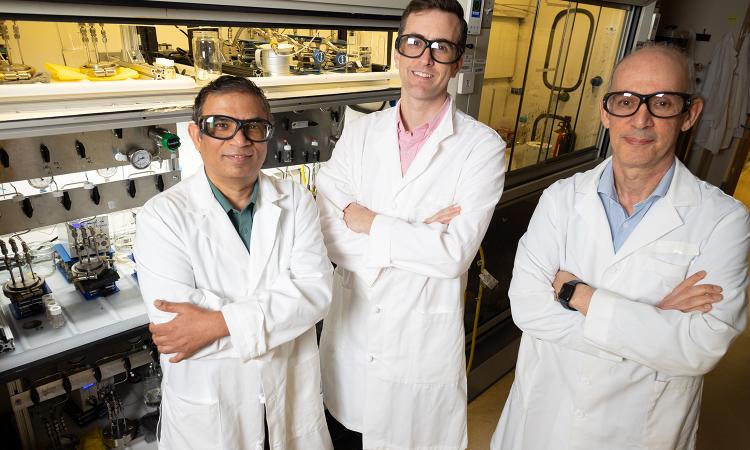
New Polymer Membranes, AI Predictions Could Reduce Energy, Water Use in Oil Refining
The membranes would improve distillation processes that account for 1% of the world’s energy use.
School of Civil and Environmental Engineering
Donald Webster
Karen and John Huff Chair
“CEE researchers are using AI, machine learning, and data analytics to enhance our work and enable results at a scale previously unimaginable. These advanced computational tools are embedded in a required undergraduate course as well as technical-elective and graduate-level courses.
Our faculty and students are applying AI to their work in innovative ways: Using massive datasets to assess and improve the condition of our roadways; addressing challenges facing our food system to improve sustainability and resilience; advancing system modeling efforts; and helping communities implement smart solutions to improve safety.”

Finding a Better Way to Use Cameras to Reduce Crime
Crime rates have dropped in Warner Robins, Georgia, with CEE researchers’ use of data-driven, AI guided camera placement.
School of Electrical and Computer Engineering
Arijit Raychowdhury
Steve W. Chaddick Chair
“ECE is positioned where AI meets the physical world and interacts with humans. To effectively engage students across the AI stack, we’re pioneering educational approaches that provide direct engagement with leading AI technology. Initiatives such as the AI Makerspace will enhance students’ expertise, producing the next wave of AI leaders. By reimagining existing courses and introducing new ones, we’re complementing our theoretical AI curriculum with practical exploration. This approach empowers students to address real-world AI problems, develop sophisticated applications, and showcase their AI-driven ideas on a larger scale.”

Creating Sensors to Think Through Digital Clutter
Researchers in a $32 million center are working to create new sensor chips that only capture and extract the most useful information from the environment.
H. Milton Stewart School of Industrial and Systems Engineering
H. Edwin Romeijn
H. Milton and Carolyn J. Stewart Chair
“The field of industrial and systems engineering includes developing AI tools and deploying them in engineering contexts. ISyE is leading the charge. We play a critical role in advancing research on efficient methodologies in optimization, data science, and machine learning. Combined with systems-thinking, our researchers use these methodologies to take a leading role in addressing critical societal challenges such as supply chains, health systems, energy, and sustainability — while ensuring fair and ethical implementation.”
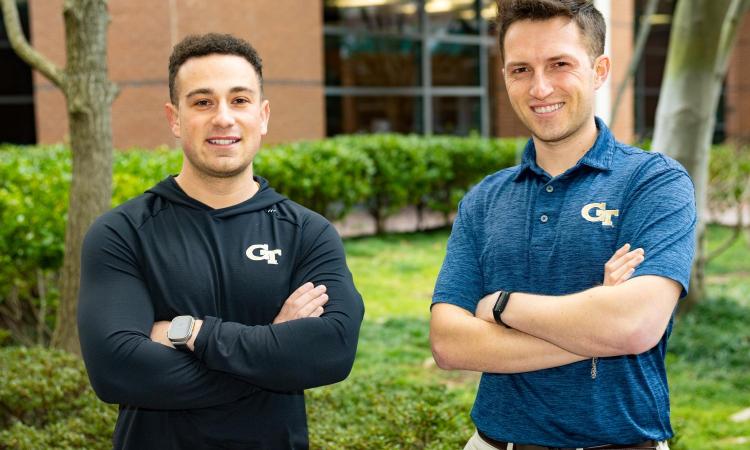
Managing the Ups and Downs
With GlucoSense, alumni are creating a single tool to help diabetes patients wrangle data to better manage their health.
School of Materials Science and Engineering
Natalie Stingelin
Chair
“In MSE, AI and ML are being leveraged to discover and design new materials, build predictive models, simulate material systems, and advance the understanding of processing-structure-properties relationships of materials and materials systems.
Our undergraduate students are using AI and ML in research labs alongside grad students. In the curriculum, we are integrating ChatGPT into senior design, using it as a coach to give students feedback on the documents they generate while solving a design challenge proposed by industrial sponsors. Students are learning the tool’s limitations and that you can use it to do more than just rewrite documents.”

High-Performance, Sustainable Fuel Cells
MSE’s Emma Hu has developed machine learning workflows to quickly evaluate potential fuel cell catalysts.
George W. Woodruff School of Mechanical Engineering
Devesh Ranjan
Eugene C. Gwaltney, Jr. Chair
“The Woodruff School has been a pioneer of new research directions in graduate education in manufacturing since the early 1980s. We continue that tradition, transforming our graduate program in manufacturing by incorporating AI and machine learning technologies in virtually all doctoral research projects. This allows us to rethink the future of the manufacturing industry.”
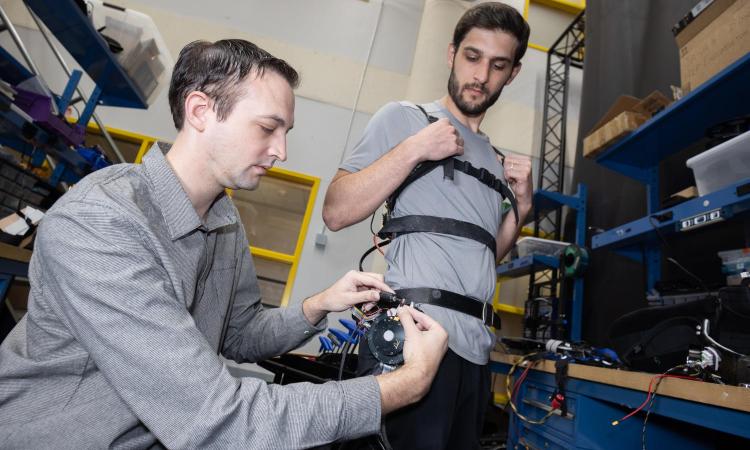
Universal Controller Could Push Robotic Prostheses, Exoskeletons Into Real-World Use
ME researchers have created an AI-driven controller for robotic assistive devices that requires no training or calibration.
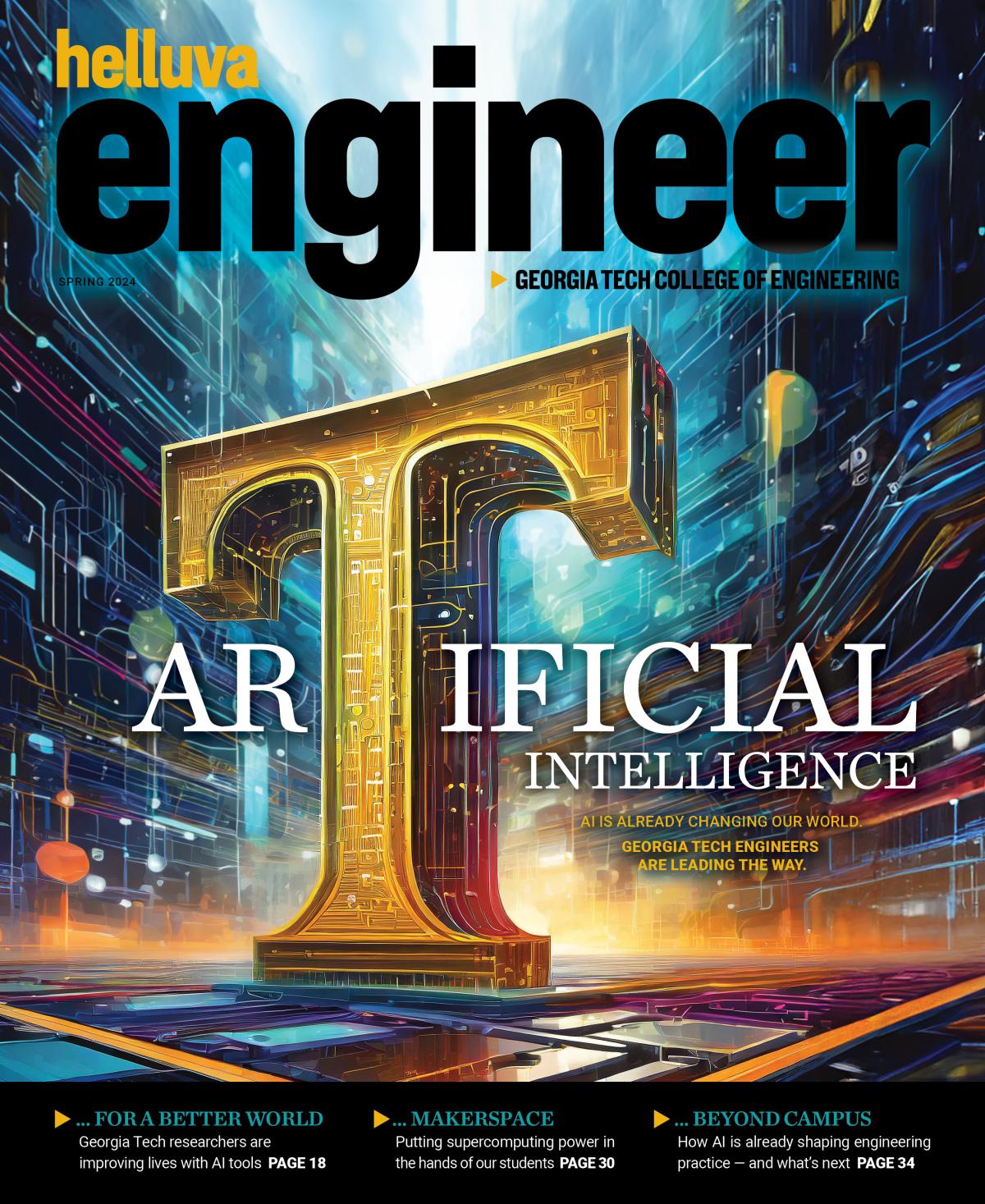
Helluva Engineer
This story originally appeared in the Spring 2024 issue of Helluva Engineer magazine.
Georgia Tech engineers are using artificial intelligence to make roads and rivers safer, restore or boost human function, and enhance the practice of engineering. We’re building the technology and infrastructure to power tomorrow’s AI tools. And we’re giving our students the AI courses and supercomputing power they need to be ready. AI is changing our world, and Georgia Tech engineers are leading the way.